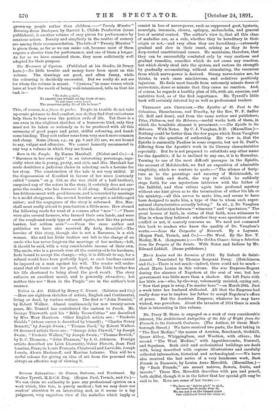Born in the Purple. By Emma Marshall. (Nisbet and Co.)—A
" Baroness in her own right " is an interesting personage, espe- cially when she is young, pretty, and rich, and Mrs. Marshall has made doubtless a judicious choice in selecting such a heroine for her story. The construction of the tale is not very skilful. If the dispossession of Rosalind in favour of her niece (curiously called " cousin " on p. 330, as she was child of a half-brother), surprised any of the actors in the story, it certainly does not sur- prise the reader, who has foreseen it all along. Rosalind accepts her dethronement with good-humour, and is rewarded by marriage to a model clergyman ; the second heroine accepts a middle-aged suitor; and the scapegrace of the story is reformed. Mrs. Mar- shall must really attend to punctuation a little more. How absurd the following reads for want of a comma after " now " !—" There were also several farmers, who farmed their own lands, and were of the rough-and-ready type of small squire, now like the private banker, but seldom seen."—From the same author and publisher we have also received My Lady Bountiful.—The heroine of this story, though she is not a Baroness, is a rich woman. She and her little brother are left to the charge of an uncle who has never forgiven the marriage of her mother,—left, it should be said, with a very considerable income of their own. The uncle, who is a proverb over all the country-side for hardness, feels bound to accept the charge,—why, it is difficult to say, for a refusal would have been perfectly legal, as such burdens cannot be imposed on a man against his will. The reader will under- stand that all turns out for good, though the little brother has his life shortened to bring about the good result. The story enforces an excellent moral, and is generally attractive ; but neither this nor " Born in the Purple " are in the author's best manner.


































 Previous page
Previous page